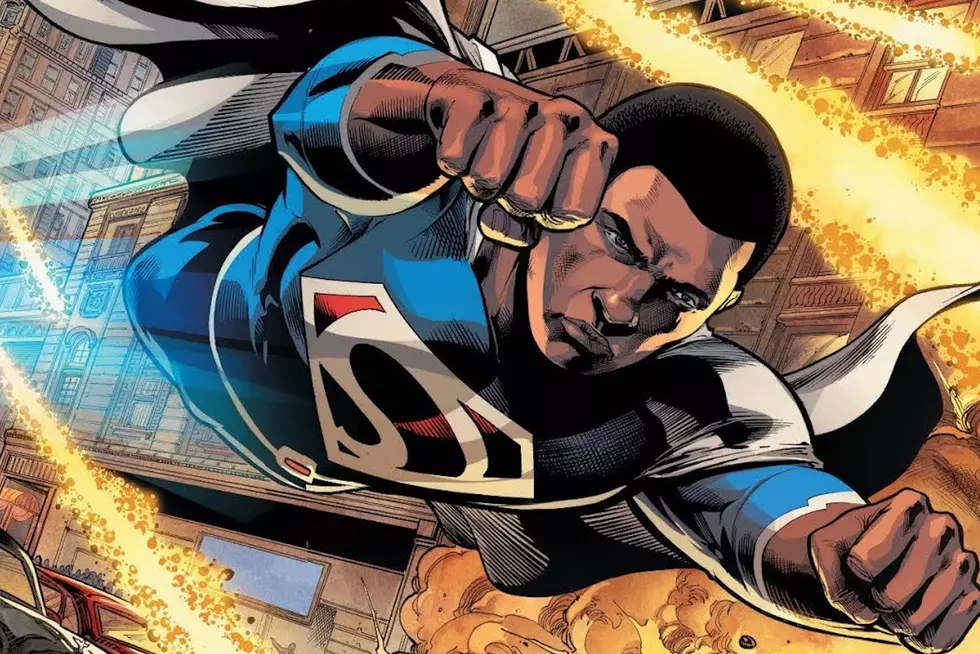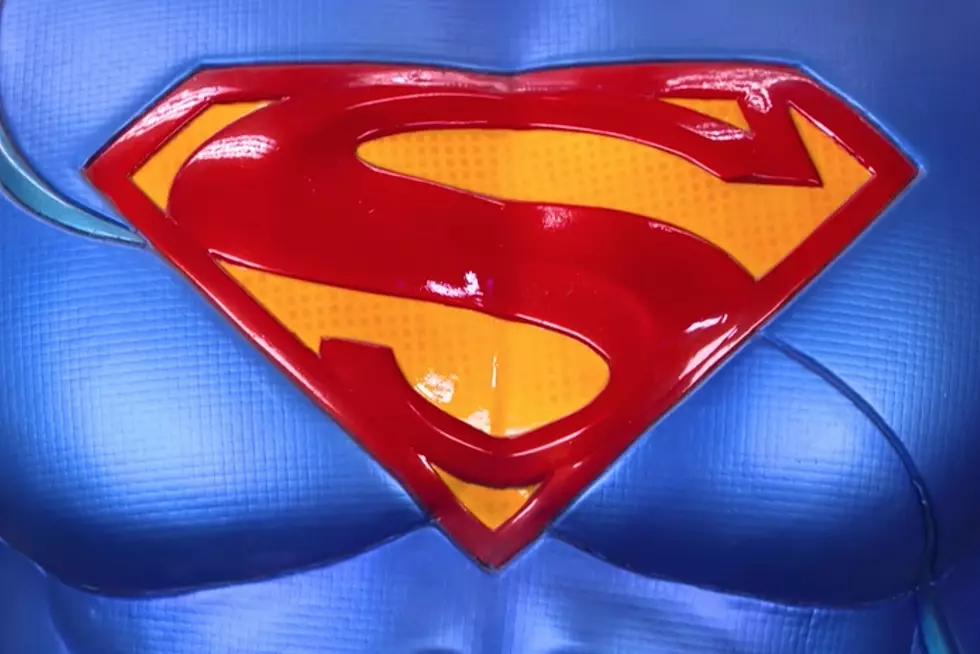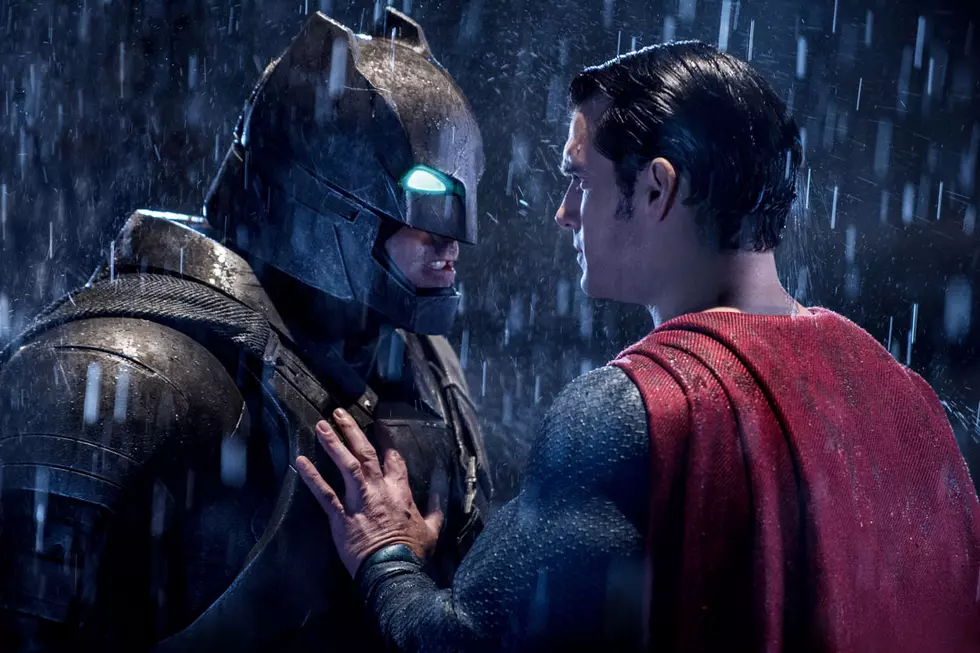
Superhuman Error: What Conservatives Chuck Dixon & Paul Rivoche Get Wrong About Politics In American Comics
Comics creators Chuck Dixon and Paul Rivoche have written a piece for the Wall Street Journal titled, “How Liberalism Became Kryptonite for Superman: A graphic tale of modern comic books’ descent into moral relativism.” Beating familiar conservative pundit drums like jingoistic nostalgia and referencing a lot of demonstrably incorrect information, these two experienced pros manage to paint a picture of an industry tottering on the edge of moral collapse to an audience -- readers of WSJ -- that knows little about what’s actually going on in cape comics and the American comics industry in general.
The goal here, of course, is to sell comics. By complaining to WSJ's ostensibly conservative audience about how liberals have taken over the American medium, conservatives Dixon and Rivoche attempt to persuade non-comics readers to buy their new book, an adaptation of Amity Shlaes' The Forgotten Man, as an exercise in political activism.
For those unfamiliar with their accomplishments, Dixon and Rivoche have created great and enduring work in comics. While writing one of the most popular and fan-favorite eras of Batman comics in the 1990s (including Detective Comics, Robin, Birds of Prey and Nightwing), Dixon and artist Graham Nolan co-created the villain Bane, now a household name. Working with Dean Motter, artist Rivoche developed the hugely influential Mister X, whose creative progeny includes, most notably, Batman: The Animated Series. Both have numerous other credits to their names.
Like many conservative comics fans, Dixon and Rivoche bemoan the lack of conservative comics being published today, and a perceived liberal bent of the industry, while limiting their definition of comics primarily to superhero books published by Marvel and DC Comics.
The problem is not with their politics; it’s with their misrepresentation of the industry and its history.
Dixon and Rivoche start their piece by saying:
In the 900th issue of Action Comics, Superman decides to go before the United Nations and renounce his U.S. citizenship. “’Truth, justice and the American way’—it’s not enough anymore,” he despairs. That issue, published in April 2011, is perhaps the most dramatic example of modern comics’ descent into political correctness, moral ambiguity and leftist ideology.
They go on to say;
With the rise of moral relativism, "truth, justice and the American way" have lost their meaning."
Dixon and Rivoche have drawn their line in the sand, then, as "conservative = American with a sense of right and wrong," and "liberal = morally ambiguous." The term “moral relativism” is beloved by conservatives when talking about liberals. The term is often used incorrectly, however, or misunderstood.
There are different kinds of moral relativism, including descriptive moral relativism -- the idea that there are widespread moral disagreements across different societies as a fact, and that those disagreements are more significant than agreements -- and meta-ethical moral relativism -- the idea that moral judgments are not absolute, but instead relative to individual groups. Just using the term “moral relativism” is actually not all that helpful or accurate.
The way this idea gets tied into liberalism for conservatives seems to be two-fold. One; many liberals preach tolerance and acceptance for cultures and people whose ideals differ from our own. This is often assumed to be related to moral relativism, but is not in fact considered such by actual philosophers who write about these things. Two; moral relativism leads to moral ambiguity. Accepting the morals of other cultures will lead to the downfall of American society, which has for hundreds of years been primarily Judeo-Christian in its moral view. In other words: dogs and cats living together -- mass hysteria.
Now, to be fair, the issue of Action Comics that Dixon and Rivoche cite is a particularly political one, but since when has it been okay to claim that only conservatives are patriotic? Or that it’s “politically correct” for someone to care about what happens beyond the boundaries of their own country? Why wouldn't an alien from another planet want to help his entire adopted home planet, versus just his home country? You could argue, as this issue of Action does implicitly, that limiting Superman to just America is like limiting a Green Lantern to one half of a planet in his sector.
But the merits of David S. Goyer and Miguel Sepulveda's comic are a discussion for another time, really. The problem here is that Dixon and Rivoche are pretending before an ignorant audience that within that story, Superman has forsworn his home country because of those damn liberals and in a particularly dramatic way. The truth is that this was a short story in anniversary issue filled with them, and one that really didn't matter in the long run. Was it a political story? Yes. Did it ultimately impact the tone of other Superman stories? Not at all. Indeed, Goyer's own Man of Steel script goes out of its way to identify Superman as a firmly American character when he tells a military commander, "I'm from Kansas; I'm as American as it gets."
Dixon and Rivoche continue by saying:
This story commences way back in the 1930s. Superman, as he first appeared in early comics and later on radio and TV, was not only “able to leap tall buildings in a single bound,” he was also good, just and wonderfully American. Superman and other “superheroes” like Batman went out of their way to distinguish themselves from villains like Lex Luthor or the Joker. Superman even battled Nazi Germany and Imperial Japan during World War II.
Superman is “wonderfully American,” but Dixon's criteria for that judgement might be ignoring other pieces of the Superman mythos that would seem to be at odds with contemporary conservative values. Is Superman not the ultimate "illegal alien"? He wasn't born in the U.S., his biological parents weren't born in the U.S. ether, and he didn't enter the country in any state-approved way -- plus he’s literally an alien. Yet he’s built his life in the U.S., continues to work in the country, and, one short story notwithstanding, identifies as a proud American.
Real-life humans whose stories reflect that dimension of Superman are as a group frequently targeted by conservative politics, so it's Interesting that the Man of Steel is the figure being upheld by Dixon and Rivoche as the conservative ideal.
The greater and more damaging implication in Dixon and Rivhoche's piece is that only American conservatives can actually perceive right and wrong, and this is incredibly limiting both to our society and to our entertainment. The two authors attempt to draw a correlation between the idea of accepting or even just respecting other viewpoints and understanding right and wrong at all.
This is incredibly flawed. People who tolerate other folks with different opinions do not, as a rule, lack a moral compass – they simply are willing to listen to others. It’s not as if that is a solely liberal trait, either. Why draw that comparison? When America entered World War II, were all of our soldiers Republican? Or is the rise of what the authors call moral relativism (again, most likely meaning "tolerance") only a recent phenomenon, and prior to that, liberals were okay? There are a lot of people in this country today who are “good, just and wonderfully American” and plenty of those people are not conservatives. Or even citizens.
There were also superheroes who “fought” in World War II who were not conservative or who did not uphold particularly conservative political beliefs. Superman might be considered conservative by some. That’s probably the reason they cited him specifically rather than, say, Captain America.
Cap can actually be interpreted as a liberal hero based on his origin and early stories set during WWII. As political historian Steven Attewell writes; “unlike other patriotic superheroes (like Superman, for example), Captain America is meant to represent the America of the Four Freedoms, the Atlantic Charter, and the Second Bill of Rights – a particular progressive ideal … there’s nothing ‘revisionist’ or ‘politically correct’ about portraying Steve Rogers as an explicitly progressive superhero. Without that, he wouldn't be Captain America.”
As well as hailing Superman as a (fictional) war hero, Dixon and Rivoche also cite some Superman radio episodes in which Superman led a crusade against the Ku Klux Klan, which they reference in the context of conservatives' allegedly stronger understanding of justice. To be fair, the KKK did in its earliest incarnation target Republicans, and Southern Democrats had plenty of racists and bigots among them. But it seems odd to bring up race in regards to liberals vs. conservatives, as Republicans consistently tolerate racism within their party and block legislature meant to address racism, plus they are significantly more white than other political parties. It's a very cool thing that Superman was employed as anti-racist propaganda, but it would seem, based on their own track record on civil rights for minorities, that contemporary conservative politicians have more to learn from the Man of Steel's example than modern day liberals.
Where Rivoche and Dixon’s piece transcends mere wrongness into weirdness when they write about comics from the 1950s to the 1970s. In that section, they speak of the loathsome Comics Code Authority with what sounds like teary-eyed nostalgia.
That’s right. In an article bemoaning the lack of free speech in comics because of oppressive liberal values, two men who presumably share a political ideology that believes in minimizing government manage to talk with admiration about a literally oppressive set of censoring regulations that the comics industry imposed on itself following actual government hearings (inspired by Fredric Wertham’s Seduction Of The Innocent) about whether comics -- even superhero comics -- were corrupting children.
When Dixon and Rivoche say of one of the CCA’s rules that “there were still good guys and bad guys,” it’s like they’re pointing to the Code as a kind of proper morality that they wish comics still had. This is not longing for free speech. This is longing for a limited kind of morality that matches the authors’ own particular set of morals.
Then they go down this rabbit hole:
The 1990s brought a change. The industry weakened and eventually threw out the CCA, and editors began to resist hiring conservative artists. One of us, Chuck, expressed the opinion that a frank story line about AIDS was not right for comics marketed to children. His editors rejected the idea and asked him to apologize to colleagues for even expressing it. Soon enough, Chuck got less work.
There are several points worth raising here.
- What comics publisher was Chuck Dixon writing for during the '90s that was making comics for children? Presumably this wasn't a storyline they wanted to run in The Simpsons comics, which means it was probably a Marvel or DC book, which haven’t really been for kids since those halcyon CCA days they spoke about earlier.
- If this was, as I suspect, about the Speedy/HIV storyline, it only makes sense that Dixon's comments necessitated an apology given that the writer of that story, Judd Winick, actually lost someone close to him to HIV/AIDS -- as chronicled in the graphic novel Pedro And Me.
- Dixon is the writer who had teenage heroine Spoiler get pregnant and give the baby up for adoption – couldn't that be seen as a political storyline that was inappropriate for children? After all, it involves teen sex, and since she wasn't on birth control and didn't get an abortion, it can easily be seen as a bit of conservative politics to encourage girls to go the adoption route. Yet that story was published.
- All creators have times of more work and times of less work. Certainly comics is more liberal than conservative these days, but outspoken conservatives like Ethan Van Sciver and Bill Willingham don’t seem to be hurting for work.
Dixon and Rivoche also bemoan the dark and gritty turn superheroes have taken, and the “code of political correctness and moral ambiguity.” Again, this is just factually inaccurate. The tonal shift from black-and-white morality of older comics to the pervasive "grim and gritty" aesthetic of the '90s was not ushered in solely by liberal creators. It's true that Alan Moore and Frank Miller (now an outspoken right-winger) wrote popular works in this vein (Ronald Reagan was actually a villain in Miller's The Dark Knight Returns), but then again, so did Chuck Dixon, whose Punisher comics -- where the protagonist circumvents the law to murder anyone he thinks deserves it -- are remembered as some of the most intensely dark and violent anti-hero comics of the era.
The tonal shift had less to do with politics and more to do with fashion and an aging audience. To assign a political bent towards these changes because of “political correctness and moral ambiguity” is like accusing anyone who believes in tolerance of actively encouraging crime. Tolerating other viewpoints does not equal anarchy or a lack of morals.
Later in their piece, Dixon and Rivoche hold up the graphic novels Persepolis and Maus as examples of popular comic books that do not fall on either side of the political divide. This is just completely incorrect.
The story of author Marjane Satrapi's childhood growing up in Iran during the Islamic Revolution, Persepolis is a manifestly anti-fascist work. Likewise, Art Spiegelman's Maus dramaticized his father's ordeal during the Holocaust.
These comics may not, in Dixon and Rivoche's minds, “parrot the progressive line,” but the truth is that these are political comics that Dixon and Rivoche happen to accidentally have enjoyed.
There are a lot of other issues in the phrasing chosen by Dixon and Rivoche that help spread incorrect facts to WSJ readers who likely wouldn't know any better. Simple things like saying comics are for kids, referring to Comixology as a company that “translates comics to e-books,” or describing San Diego Comic-Con International simply as “the annual comics convention.”
Perhaps most crucially, Dixon and Rivoches pretending that American comics are made up entirely of superhero comics, rather than discussing the wide range of work that exists and is successful today, ignores the fact that there is room in the comics market for a book like the one Dixon and Rivoche have produced. If the only comics that existed were the superhero books and graphic novels they discuss, they would never have had the chance to create their new book.
Two accomplished pros should know the facts about the industry and be able to speak to an audience beyond the industry in an accurate way. Individually these things don’t matter much, but when it adds up with all the other incorrect information out there in the world about American comics, it keeps readers away by misrepresenting the vitality of the industry. Their use of rose-colored glasses of nostalgia and political fallacies may help them sell more comics to an audience inclined to accept such notions without further investigation, but it won’t do the industry any good in the long run. In the end, that is the issue – the comic industry was just misrepresented to an audience that probably doesn't care at all, but that will now carry this misinformation forward with them into any future contemplation of the work and medium and community we all love.
But Dixon and Rivoche are right that there should be more conservative comics. They’re both talented creators who have written some amazing and influential comics and created some important characters. Their choice to blame liberals for the problems they see in comics may be flawed, but they still deserve the opportunity to produce comics that accurately represent their world view -- and they've taken the advice so many internet commenters are eager to throw at comics feminists online, which is, “If you don’t like what’s being made, make your own comics.”
More From ComicsAlliance









